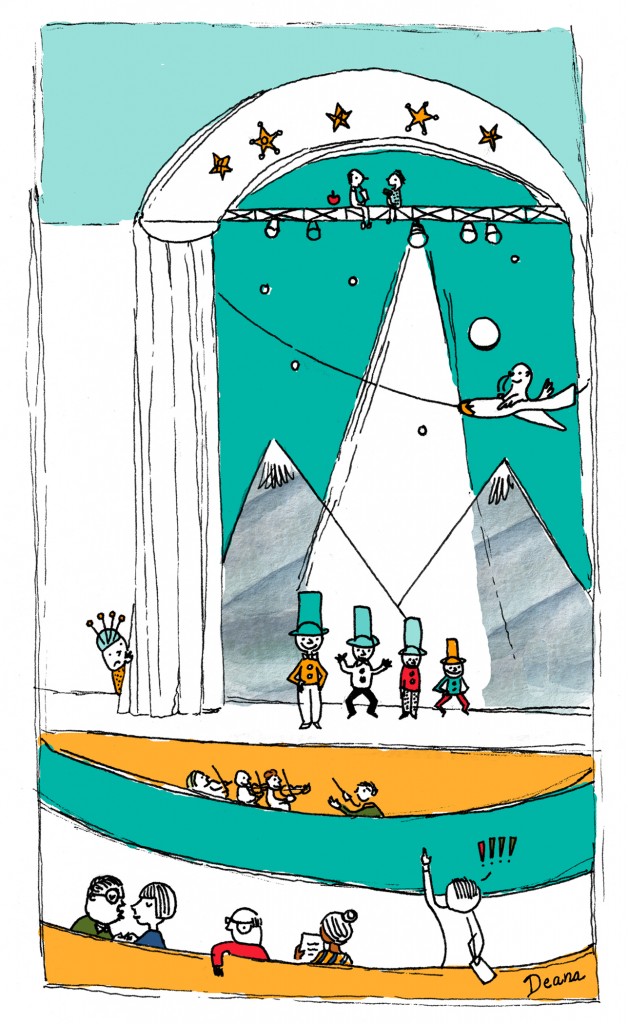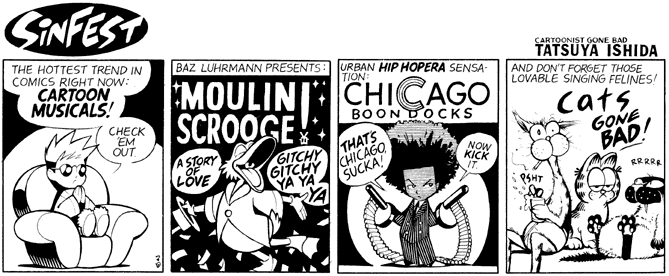Discussion Club Intermediate: The History of Musical
The History of Musical
 The musical is a type of drama that is noted for its spoken and musical interchanges and is liberally interlaced with singing and dancing. The main characters - often soloists - are a part of a plot that can be of a serious or comical nature. This freedom of tone is unique to the musical, especially in contrast to the opera that spawned it.
The musical is a type of drama that is noted for its spoken and musical interchanges and is liberally interlaced with singing and dancing. The main characters - often soloists - are a part of a plot that can be of a serious or comical nature. This freedom of tone is unique to the musical, especially in contrast to the opera that spawned it.
The opera's first essence of popularity can be traced to the late eighteenth century, when it was a focal point of aristocratic entertainment. Operatic plots were serious, even tragic, and were sung in Italian. The presentation was dominated by soloists. There were no choruses or groups.
Toward the close of the 1700's, however, the opera's significance waned as the middle class struggled for recognition among its European countrymen. The opera was too serious and hard to understand for most middle-class working men. The need for a "working man's opera" became apparent. And thus was born the "operetta." Also known as the comic opera, the operetta was designed as an alternative to the serious opera associated with the upper class. In fact, many plots were satires that poked fun at the nobles.
The operetta was sung in the language of the country in which it was presented. Plots were lively, down-to-earth, and often humorous. Many operettas were based on comical situations where a main character found himself in a quandary as to what to do. It was not uncommon to see the hero step to the front of the stage and address the audience with a question of consternation such as, "How did I ever let this happen?" Such audience interaction was far different from the serious atmosphere associated with the opera.
By far, the greatest difference between the musical and the operetta was in the music itself. As the plots were less serious, so was the tone that was set for the songs. In contrast to the star performances of the opera's solo artists, an operetta chorus often joined the comic opera's soloists in their presentations.
One of the first composers to break with the serious and create a comic opera was Mozart. Collaborating on words with Lorenzo de Ponte, Mozart penned "The Marriage of Figaro" to be debuted in Paris, far away from a very traditional Vienna. In the plot of "Figaro," a man and woman fall in love but find their relationship always precariously positioned. For example, with one man in her room pledging his love to her, the character Susanna answers a knock on her door only to discover a second man. This man bursts into her room singing a song of his undying love for her. Susanna sings a response, pledging her loyalty to him. This, however, is not received well by the second suitor as he has inadvertently discovered the first man hiding under Susanna's dressing table.
Christoph Gluck was another composer who dared to diverge from the old into the new by writing "Don Juan." Gluck liked to call his work "reform opera" because he said it was more natural and had a more understandable story line. He also incorporated dance and choreography into the operetta, although the first attempts were more like ballet than what we think of today as choreography. He, like Mozart, took his comic opera to Paris because Vienna was not ready to accept the "reformed" style.
As a new century dawned, an even more relaxed style of musical entertainment was evolving - vaudeville. This was a talent show of sorts, featuring magicians, acrobats, comedians, trained animals, jugglers, singers, and dancers. Many of the songs put new words to old popular tunes, these words often ridiculing politicians of the day. Unfortunately, early vaudeville was not considered "respectable" and was performed only in beer halls. This made clientele limited at best.
Vaudeville had a profound influence on comic opera because it satired the nobility, the rich, and the powerful. In Paris, in 1858, Jacques Offenbach offered middle class patrons two comic operas entitled "Orpheus of the Underworld" and "The Parisian." In both, Offenbach poked fun at the upper crust of Paris. In Vienna, in 1870, Johann Strauss the Younger produced "Die Fledermaus," another satirical and musical entertainment piece. It too was a satire. This was a stretch for the Waltz King, making Strauss the focus of much talk in the musical city.
In the United States, Tony Pastor, a singer and entrepreneur, established a theater in New York for the "clean" variety show. It was a resounding success, leading the way in making the variety show suitable as "family" entertainment. Not only did this increase the vaudeville following, but it provided an introductory stage for many talented artists. Famous vaudeville stars of the late 1800's included W.C. Fields, juggler and comedian; Will Rogers, cowboy and comic story-teller; and Lillian Russell, singer and actress who was dubbed the "American Beauty."
While all of this was happening in the United States, the operetta was gaining popularity in England. Probably the most famous of the first musicals is the "HMS Pinafore," written in 1878 by the English team of Gilbert and Sullivan. In the plot of this carefree operetta, the captain learns that his daughter has fallen in love with Ralph, a common sailor. The captain cannot allow his daughter to marry Ralph as she has been promised to the First Lord of the Admiralty. As luck would have it, the First Lord of the Admiralty schedules a visit to the ship. The lovers try to elope, but they are apprehended. Then, through a series of coincidences - and just in the nick of time, of course - the captain discovers that Ralph's birth certificate is inaccurate and that he is really well-born. The lovers marry. With its happy non-operatic ending, HMS Pinafore signified the rising popularity of a musical comedy form.
In the United States, an ever-evolving entertainment industry ushered in a new era and silent movies emerged. This brought about the decline of vaudeville. The stars of the vaudeville stage looked for other opportunities to perform, just as the operetta - on the heels of the HMS Pinafore success - made its way to America. The two forms blended to create the musical.
Victor Herbert introduced the United States to the musical with "Babes in Toyland" in 1903. And in the years that followed, Americans were entertained by the acting, singing, and dancing of performers in "The Highwayman," "The Student Prince," "Kiss Me Kate," "Finian's Rainbow," "Guys and Dolls," and "My Fair Lady."
Most of the first American musicals were based on comical, even silly, plots. The characters contrived to host songs, dances, and dialogues of a humorous nature. But in 1927, Jerome Kern changed all of that, writing a musical called "Showboat." This musical, based on Edna Ferber's novel, forced viewers to concentrate on a serious plot full of racial overtones. In 1935, George Gershwin followed with "Porgy and Bess," and in 1957, Leonard Bernstein used "West Side Story" to call serious attention to racial discrepancies.
In the 1940's, the famous American writing team of Richard Rodgers and Oscar Hammerstein collaborated and combined their talents to produce "Oklahoma." That was only the beginning of what this team would do. Rodgers and Hammerstein produced "Carousel," "South Pacific," "The King and I," and "The Sound of Music." "Oklahoma" and "South Pacific" won Pulitzer Prizes.
Because the musical's style is characteristically free, it has adapted to change as America has metamorphosed from one cultural transformation to another. From "Singin' in the Rain" to "Grease," the characters have donned the costumes of the era to dance in the streets. With "Jesus Christ Superstar," "Hair," and "Godspell," the musical crashed through every barrier, right into a new genre called the "rock musical."
The musical - from opera to rock - has blended, glided, converted, and crashed into new realms of harmonious, and sometimes unharmonious, existence. Always adapting and changing, the musical has transcended the traditional and rocked the boat with the new. And the journey isn't over.
Written by Elaine Schneider
Assignments.
I. Consult the dictionary for correct pronunciation of the following
Soloist, chorus, operetta, quandary, debut, choreography, ballet, vaudeville, clientele, entrepreneur, to metamorphose, era.
Soloist, chorus, operetta, quandary, debut, choreography, ballet, vaudeville, clientele, entrepreneur, to metamorphose, era.
II. Explain the meaning:
To be liberally interlaced with singing & dancing; to pen sth to be debuted; to pledge one’s love/loyalty to smb; to put new words to old popular tunes; the vaudeville following; as luck would have it; in the nick of time; to usher in a new era; on the heels of smb’s success; to metamorphose from one cultural transformation to another; to crash into new realms of harmonious existence; to rock the boat (with the new).
III. Fill in the prepositions and make up the sentences of your own:
To be noted ___ sth; ___ contrast ___ sth; to poke fun ___ smb; to break ___ sth; to collaborate ___ sth; to diverge ___ sth ___ sth; to bring ___ the decline; to crash ___ the barrier.
IV. Translate using the given word with the necessary preposition/adverb.
1) to introduce
Виктор Герберт познакомил Соединенные Штаты с мюзиклом…
Новый век внес в мир музыкальных постановок понятие “оперетты”.
2) to struggle
Средний класс боролся за признание в обществе.
Нам было невыносимо тяжело, но мы продолжали сражаться.
3) to set
Виртуозному композитору не составляет труда положить стихи на музыку.
Голос нередко подбирается к песне.
4) far
Несомненно, отличие оперы от оперетты заключается не только в музыке.
Современный мюзикл далек от своего прародителя, привезенного из Англии.
5) to feature
В фильме главную роль поручили молодой актрисе.
На этой неделе в кинотеатрах идет фильм с П. в главной роли.
В этом спектакле она сыграла роль Офелии.
6) to adapt
Мюзикл приспособился меняться вместе с переменами в стране.
Это произведение мы инсценировали в школе.
V. Collect the substantivized adjectives from the text and translate them. Ex.: the young – молодежь.
VI. Find the equivalents to the following vocabulary & restore the sentence:
To produce/give birth; key (adj); fade away; obvious; to laugh at (3); to introduce; great (2); to appear; to put on.
VII. Give vivid examples of the Infinitive from the text and state it’s function.

